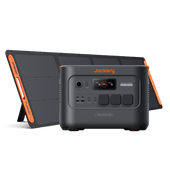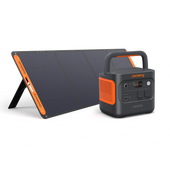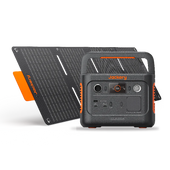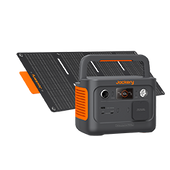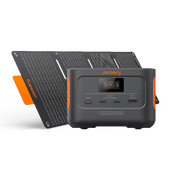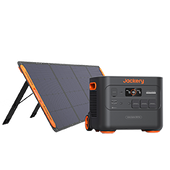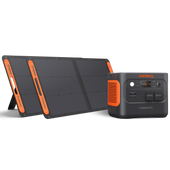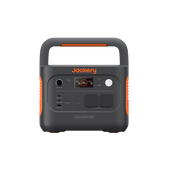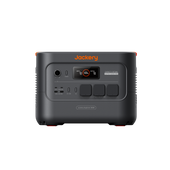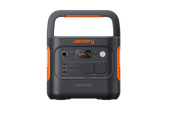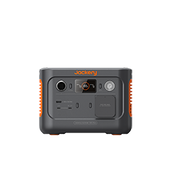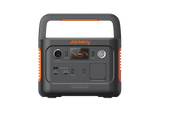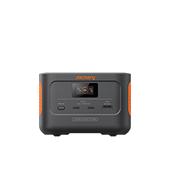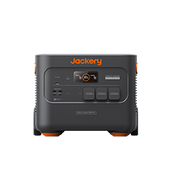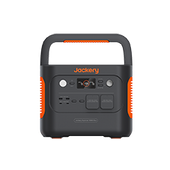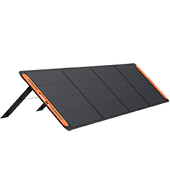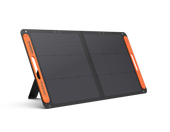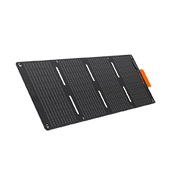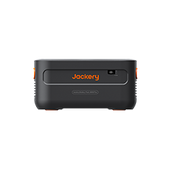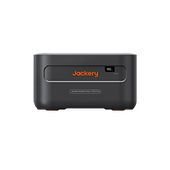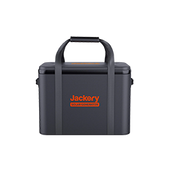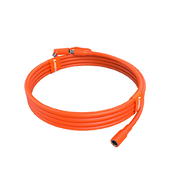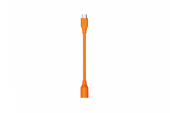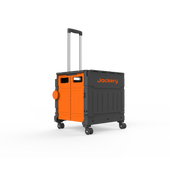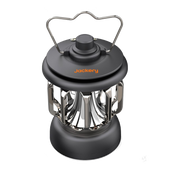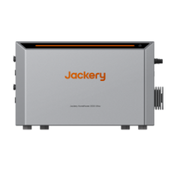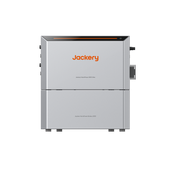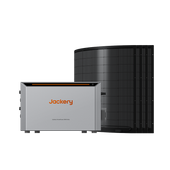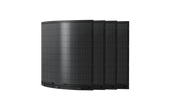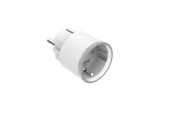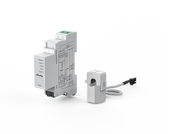How Long Does a Solar Generator Keep Your Home Appliances Running?
Are you looking for an off-grid solar generator but unsure whether it’ll run your appliances? Or do you just want a sustainable backup for emergencies or outdoor use? Whatever the case, understanding the runtime of the solar generator is crucial to ensure the seamless functioning of your appliances.
Knowing how long a solar panel generator can keep your appliances running is vital for effective energy management, determining your backup power needs, and optimizing the overall performance of your system.
Let’s explore their mechanism in detail and the factors influencing the runtime. We’ll also provide insights into estimating the duration for which these eco-friendly devices can power your appliances. Let’s get started.

Basics of Solar Generators and Their Working Principle
1. Solar Panels
2. Portable Power Station
It integrates three devices into a sturdy shell:
- Charge Controller: Solar panels generate electricity and move it to the regulator (charge controller). It then shapes electricity and utilizes MPPT technology to prevent overcharging and any chance of damage when electricity flows throughout the system.
- Inverter: It turns DC output from the panel to AC and then transports it to your home appliances.
- Battery: The battery stores electricity till the time you need it. The lithium-ion battery is most common and built-in in most generators.
Solar generators are portable and quiet, making them a great option to supply power anywhere. Also, it’s sustainable and renewable energy emitting no pollutants. Less maintenance is required as you only need to dust your system to enhance absorption by the sun. Despite the high upfront cost, the convenience is unmatched.
Factors Affecting Solar Generator Runtime
After understanding the basic mechanism, it’s easy to interpret that the electricity stored by solar generators is limited. But how can you analyze whether it’s sufficient for your home appliances? Let’s discuss some factors that’ll impact the runtime and operations of your solar panel generator.
1. Battery Capacity and Energy Storage
2. Power Consumption of Home Appliances
- Peak power output refers to the starting watts of a device, and your generator will represent the temporary power surge when starting devices like mini-fridges, fans, or electric motors. The measurement is higher than running watts, indicating sustained power output.

3. Solar Panel Efficiency and Sunlight Availability
4. Inverter Efficiency and Power Losses
Solar generators use inverters to convert the direct current (DC) into alternating (AC) power suitable for household appliances. The inverter efficiency impacts the overall performance of the solar generator.
Higher-efficiency inverters lead to low power loss during the conversion process. Hence, more energy can be effectively utilized by the appliances. Conversely, lower-efficiency inverters dissipate energy as heat, reducing the overall runtime of the solar generator.
Wiring resistance and electrical losses within the system also cause power losses. You can minimize them through proper installation and maintenance of your generator.
5. Battery Types and Cycles
The battery types and cycles also impact the generator runtime. The common types include:
- Lead Acid Batteries: Least expensive but inefficient and limited lifespan
- Lithium-Ion Batteries: Long lifespan and good quality, but high priced
- Lithium Iron Phosphate: The most expensive but won’t need replacement for years
A quality battery will last for years, and efficiency will maximize the generator's runtime and overall performance.
Calculating Runtime for Home Appliances
-
Identify the devices you want to power and estimate how long you want to use them.
-
Determine the energy consumption of each device in watts. If the device specifies the amperage instead, multiply it by the voltage to convert it to watts.
Watts = Amps × Volts
-
Calculate the total watt-hours required for each device by multiplying the wattage by the number of hours you plan to use it.
-
Divide the total watt-hours by 0.85 to account for an 85% energy consumption rate during charging.
-
Add up all the individual watt-hour requirements for each device to find the total watt-hours you need the power station to provide.
-
Compare the total watt-hour requirement from the previous step to the watt.
Appliance
Power Consumption (Watts)
Runtime on 1,500 Wh Generator (hours)
Runtime on 2,000 Wh Generator (hours)
LED Light Bulb (x5)
10 (total: 50)
30
40
Laptop
50
10
13.3
Refrigerator
300
5
6
Wi-Fi Router
10
150
200
Ceiling Fan (x2)
75 (total: 150)
10
13.3
Cell Phone Charger (x2)
5 (total: 10)
150
200
Electric Blanket
100
15
20
CPAP Machine
50
30
40
Electric Toothbrush (x2)
1 (total: 2)
750
1000
Microwave Oven
1,200
-
1.7
Electric Kettle
1,500
-
1.3
Air Conditioner
(5k BTU)
500
-
4
Washing Machine
500
-
4
Dishwasher
1,200
-
1.7

Appliance
Power Consumption (Watts)
Runtime on 1,500 Wh Generator (hours)
Runtime on 2,000 Wh Generator (hours)
Television (40-55 inch)
60-90
10-15
13-20
Gaming Console
100-150
10
13.3
Blender
300-800
1.9-5
2.5-6.7
Coffee Maker
800-1,200
1.2-1.9
1.5-2.3
Hair Dryer
1,200-1,800
0.8-1.3
1-1.5
Electric Heater (1,500W)
1,500
1
1.3
Air Conditioner (10,000 BTU)
1,200-1,500
1-1.2
1.3-1.7
Electric Grill
1,200-1,800
0.8-1.2
1-1.5
Vacuum Cleaner
600-1,200
1.2-2.5
1.6-3.3
Desktop Computer
150-300
5-10
6.7-13.3
Try Jackery’s Solar Panel Generator

Jackery Solar Generator 1500 Pro
- The 1500 Pro is a portable and reliable power station with a capacity of 1512 watt-hours. It can be charged using an AC adapter in 2 hours, a 12V car adapter in 16.5 hours, or a single SolarSaga 200W solar panel in 10 hours.
- It offers various output ports, including AC, USB-A, USB-C, and a 12V car output, providing power for household appliances, devices, and tools. The 1500 Pro accepts AC input and supports DC input for solar charging. With its power capacity, the solar generator can run various appliances considerably. For example, it can power a kettle (850W) for approximately 1.4 hours, an microwave (700W) for about 1.2 hours, and a coffee maker (1120W) for approximately 1.3 hours. The runtime may vary depending on the specific appliance and its power requirements.
- With its compact design and lightweight build, the 1500 Pro allows you to enjoy the comforts of home, even in remote locations.
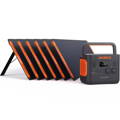
Jackery Solar Generator 2000 Pro
- The 2000 Pro is a high-capacity and efficient power station designed to meet your power needs during outdoor adventures, emergencies, or off-grid living. With a large capacity of 2160 watt-hours (Wh), this generator provides ample power for various applications.
- It can be charged using an AC adapter in 2 hours, a 12V car adapter in 24 hours, or one to six SolarSaga 200W solar panels in different charging times. It offers multiple output ports, including AC, USB-A, USB-C, and a 12V car output, enabling you to power various household appliances and tools.
- The 2000 Pro accepts AC input and supports DC input for solar charging. It can run appliances like a mini cooler, blender, coffee maker, electric grill, or air conditioner for specific durations depending on their power requirements.
- Both generators provide reliable and portable power solutions for camping, emergencies, off-grid living, etc.
Conclusion
- A solar generator can be a game-changer in keeping your home appliances running during several situations. The Jackery 1500 Pro and 2000 Pro generators offer impressive capacities and versatile charging options. With their high watt-hour capacities and various output ports, these generators can power various appliances for extended periods, from mini-fridges and coffee makers to blenders and air conditioners.
- What sets Jackery apart is its commitment to providing reliable and portable power solutions. Whether camping, tailgating, or facing a power outage, the generators offer peace of mind and ensure your appliances continue functioning smoothly.
- With our focus on innovation and quality, Jackery has established itself as a leading brand in the portable power industry. The commitment to clean energy and sustainable solutions resonates with those seeking eco-friendly alternatives. Our generators show dedication to providing reliable power sources that cater to various needs.
- Explore the world of Jackery and discover how our solar generators can transform how you power your home appliances. Embrace the freedom of portable power and enjoy uninterrupted energy whenever and wherever you need it!
Best-selling Jackery Solar Generator
Hurry up! Sale ends once the timer hits zero


